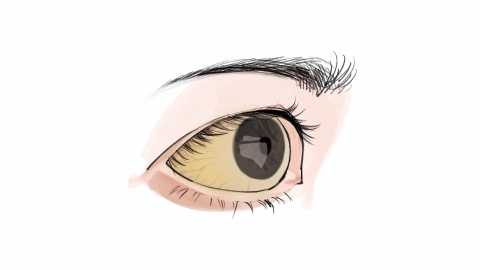What should be done if a newborn has high bilirubin levels?
Under normal circumstances, elevated neonatal jaundice may be caused by excessive bilirubin production, weak liver metabolism, breast milk jaundice, neonatal hemolytic disease, infectious jaundice, and other reasons. Patients can visit a regular hospital to choose general treatment, medication, and other methods to improve the condition. Detailed analysis is as follows:
1. Excessive Bilirubin Production
Newborns have a large number of red blood cells with short lifespans. After red blood cells are destroyed, they produce more bilirubin, which can easily lead to elevated jaundice. Increase feeding frequency to promote defecation and help eliminate bilirubin. Under a doctor's guidance, appropriate sun exposure for 10–15 minutes each time may also help.
2. Weak Liver Metabolism
Newborns' liver functions are not yet mature, and their ability to process bilirubin is weak, which may cause bilirubin to accumulate in the body, leading to elevated jaundice. Ensure adequate feeding to promote liver metabolism. If necessary, use Yinzhihuang Oral Liquid under medical guidance as an adjunctive treatment.

3. Breast Milk Jaundice
Certain components in breast milk may affect bilirubin metabolism, causing elevated jaundice, typically without other discomfort. Breastfeeding may be continued following a doctor's evaluation. In a few cases, breastfeeding may need to be temporarily stopped for 1–2 days and replaced with formula feeding until jaundice improves, after which breastfeeding can resume.
4. Neonatal Hemolytic Disease
Blood type incompatibility between mother and infant can cause hemolysis, leading to destruction of a large number of red blood cells and a rapid rise in bilirubin levels. Jaundice appears early and progresses quickly. Prompt hospitalization is required. Under medical guidance, drugs such as human albumin and phenobarbital sodium injection may be used. If necessary, phototherapy with blue light should be administered.
5. Infectious Jaundice
Bacterial or viral infections may impair liver function and hinder bilirubin metabolism, resulting in elevated jaundice, often accompanied by symptoms such as fever and poor feeding. Treatment should be administered under medical guidance using medications such as Cefotaxime Sodium for Injection, Penicillin Sodium for Injection, and Yinzhihuang Granules. Meanwhile, nursing care should be strengthened to ensure adequate nutrition intake.
In daily life, closely monitor changes in the newborn's skin jaundice; feed on demand to ensure sufficient intake; maintain hygiene to prevent infections. If jaundice persists or worsens, seek medical attention promptly.









